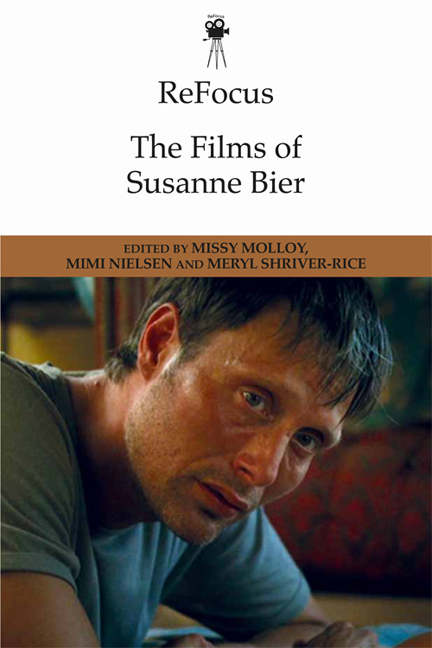Book contents
- Frontmatter
- Contents
- List of Figures
- Notes on Contributors
- Foreword
- Introduction: Susanne Bier's Boundary-Crossing Screen Authorship
- Part 1 Generic and Industrial Fluidity
- Part 2 Negotiating Identity
- Part 3 Authorship and Aesthetics
- Part 4 Transnational Reach
- Postscript: A Conversation with Susanne Bier
- Filmography of Susanne Bier
- Acknowledgments
- Index
Part 3 - Introduction
Published online by Cambridge University Press: 01 May 2021
- Frontmatter
- Contents
- List of Figures
- Notes on Contributors
- Foreword
- Introduction: Susanne Bier's Boundary-Crossing Screen Authorship
- Part 1 Generic and Industrial Fluidity
- Part 2 Negotiating Identity
- Part 3 Authorship and Aesthetics
- Part 4 Transnational Reach
- Postscript: A Conversation with Susanne Bier
- Filmography of Susanne Bier
- Acknowledgments
- Index
Summary
The chapters in this part do not provide a definitive portrait of Bier's style; indeed, the diversity of her work would challenge such an effort. Instead, by focusing closely on very particular aspects of specific works, this part's contributions establish aesthetic overlaps among Bier's works while also stressing that the styles of individual works often relate directly to their particular narrative and representational goals. Therefore, they indicate, collectively, that while distinct aesthetic features—most notably, extreme close-ups of eyes—draw attention to Bier's authorship, her tendency as a director is to adapt visual style to the narrative, generic, and psychological concerns that motivate individual works.
Chapter Eight, Mimi Nielsen's “Tracing Affect in Susanna Bier's Dramas,” straddles questions of genre and classification as found in this anthology's first part and those pertaining to aesthetics and authorship, the topic of this third part. Despite its framing as a query of genre classification, its claim of two intertwined, extensive themes apparent across much of Bier's oeuvre stresses particular stylistic and narrative traits that significantly contribute to Bier's work being both unique and recognizable. Nielsen, in support of her dual argument that Bier's films evidence a preoccupation with “intensity-as-affect,” as it moves “across and through bodies, especially male bodies,” draws from four feature films that span much of Bier's directorial career.
With scene analysis of Freud's Leaving Home (Freud flyttar hemifrån …, 1991), Nielsen addresses tendencies already evident in Bier's early cinematography, which in their application elevate Adrian's significance, a character that might otherwise have remained peripheral in a film noteworthy for its strong female portrayals. Nielsen then considers scenes from Brothers (Brødre, 2004) to substantiate her claim for affect-over-psychology as a primary focus in Bier's work, a focus particularly evident in her dramas. The role of aesthetics as key to narrative content is then closely considered in scene analyses of In a Better World (Hævnen, 2010). Finally, in her consideration of Open Hearts (Elsker dig for evigt, 2002), Nielsen reflects on the prevalence of attention to affect in Bier's work, in this instance its role in a character's self-coherence. She also addresses Bier's preoccupation with male characters and notes how these two themes coalesce and call into question assumptions of containment and self-sufficiency associated with individualism, especially those allied with concepts of masculinity.
- Type
- Chapter
- Information
- ReFocus: The Films of Susanne Bier , pp. 151 - 154Publisher: Edinburgh University PressPrint publication year: 2018



